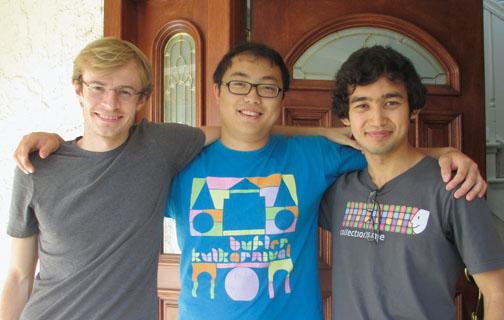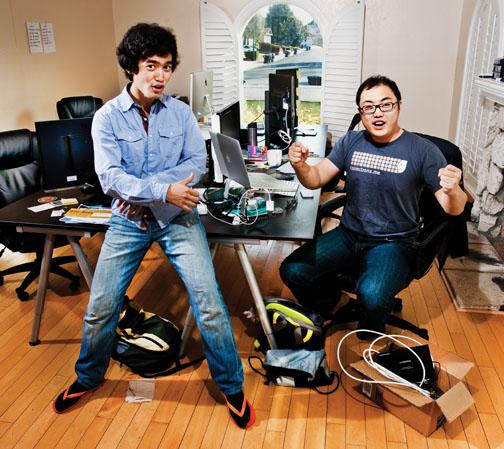THE 2,700-SQUARE-FOOT RANCH HOUSE on a quiet, tree-lined street in Mountain View, Calif., would seem perfect for a family with small children: four bedrooms and two-and-a-half baths, with a lovely terra cotta roof, a tidy front yard, a two-car garage, and a swimming pool out back. The rent — about $6,200 a month — is reasonable for the area.
Tony Xiao ’12 found the place on Craigslist last summer. He signed a one-year lease Sept. 1 and moved in the next day with two other Princetonians, Arman Suleimenov *12 and Jordan Lee, a Ph.D. student studying Chinese politics. But the baby the three are nurturing right now is their business, a file-organizing application called Collections. Like generations of small-business owners before them, they work downstairs and sleep, as it were, above the store.
On a warm morning in October, Lee sits on a plastic chair in the front yard, soaking up the sun and taking a business call while trying to be heard over the trash collectors. Rahul Subramaniam ’11 stumbles downstairs in his pajamas and says good morning. He is working on his own education business and crashing at the house until he gets settled.
In addition to the leaf-covered and apparently little-used pool, the backyard features a trampoline (the occupants’) and a pair of old tricycles (the previous owner’s), but if the young entrepreneurs want to take up an indoor sport, they might consider floor hockey. There is plenty of space for it because there is hardly any furniture. The first floor contains exactly nine computer screens but one couch.
Xiao, who says he has been hacking — monkeying with computer programming, without the negative connotations the word sometimes implies — since he was 8 years old, sits in the dining room/workspace facing five screens: three computer monitors, a laptop, and a cellphone propped in a charger. He and Suleimenov are dressed in shorts, tech-themed T-shirts, and flip-flops, huddled around a large table made of doors balanced on sawhorses. Louvered shutters partially block the sunlight, which reflects off walls that are bare except for a code-scribbled whiteboard in the kitchen.
After an initial burst, progress on Collections has slowed. A release date has come and gone, but the app still is not quite ready. The entrepreneurs’ job, of course, is to find the bugs and fix them, and they can spend as much time on that as necessary. It’s not as though they have a long commute.

THE NEW YORK TIMES GENERATED A LOT OF BUZZ last summer with an article about “hacker hostels” in the Bay Area, tiny apartment-offices with short-term leases (fewer than 30 days) catering to young tech entrepreneurs who live, sleep, and work there while they dream of launching the next Facebook. Online real-estate agencies advertise these places, offering amenities such as complimentary linens, weekly boxes of organic fruits and veggies (because most don’t have kitchens), and a projector for practicing presentations. Rents can be as low as $40 a night.
All the publicity has gotten some of the hostels in trouble. The official in charge of code enforcement in Mountain View — home of Google, southeast of San Francisco — insisted to a local news website that the hostels really are hotels, which means they would be banned from residential neighborhoods and required to collect hotel taxes. He also took issue with one hostel’s willingness to shuttle guests to the airport or to grocery stores. That, he said, is the job of a taxicab — and a cab driver needs a permit.
The house in which Xiao, Lee, and Suleimenov live is not, technically speaking, a hostel — among other things, it has a long-term lease. But Mountain View is the heart of Silicon Valley, so call it a hacker something. Maybe a hacker home.
Xiao divides the project’s history into three phases. In Phase One, he and Lee, both members of the Princeton Entrepreneurship Club, met at a 2011 lecture at the University by Peter Thiel, a co-founder of PayPal. Several months later they ran into each other when author Walter Isaacson came to discuss his biography of Apple co-founder Steve Jobs. Suleimenov joined them for dinner afterward, where they discussed the release of Apple’s Mountain Lion operating system. Xiao, who had won the Princeton Pitch competition as a freshman with a proposal for an external airbag to protect cars from damage in a crash, already was working on an idea for file-organizing software. He began writing Collections code in earnest that winter, but progress was slow because the economics major also had to finish his senior thesis, which he blandly describes as “something I had to do in addition to this.”

Phase Two consumed the summer of 2012. The partners incorporated and raised money by participating in two Silicon Valley startup programs. Summer@Highland, organized by Highland Capital Partners, provides startups with $18,000 and office space. Y Combinator, a consortium of venture capitalists, gives promising entrepreneurs three months of intensive mentoring to prepare them for the opportunity to pitch to a room of potential investors. On “Demo Day,” as it is known, the three knocked their presentation out of the park and raised an additional $150,000. These two summer programs have provided almost all of their development and living funds to date.
It also enabled them to advance to Phase Three, which began when they moved to Mountain View in September and continues today. Xiao and Suleimenov (who was working on another project and did not join Collections until September) are the techies, while Lee, who has a master’s degree in East Asian Studies from Yale and is a former research assistant at the Brookings Institution, has served as project manager, overseeing fundraising and public relations. The group members would like very much to move to Phase Four, which will coincide with the official release of their product. Downloads of the app will be free, although they plan to offer premium service for a subscription fee.
Collections, they hope, will “reinvent the file manager,” enabling users to organize not only the contents of their hard drives but everything they have on the Web and in the Cloud, including photographs, documents, and social-networking feeds. The partners have been beta-testing for more than a year, posting advertisements on hacker Web boards, and importuning friends, classmates, and acquaintances. “I never thought it would take this much effort,” Xiao says, sighing. Although they say they have enough money to stick it out for another year (and are hoping for another round of financing), their reserves are not unlimited.
“That,” he adds pointedly, “is why we have to get stuff done.”
ORGANIZING TIME AND FOCUSING EFFORT ARE the eternal problems of the self-employed. “When you’re in the middle of it” — developing a new business — “you’re blind,” Suleimenov explains. “You can’t see your hand in front on your face.”
They work six days a week, beginning each day at 9 a.m. sharp with a 10-minute meeting (standing up, to promote alertness) in which each person outlines what he plans to achieve. Every task to be done that day then is written on a Post-It note and stuck on the glass door to the dining room. Work hours are sacred; to avoid interrupting anyone in the middle of a brainstorm, the partners communicate by instant message even when sitting right next to each other. Exactly 10 hours later, at 7 p.m., they wrap up with another brief meeting to review the day’s progress. In the evenings, they prepare communal dinners (Lee, the pickiest eater, tends to cook), exercise, or go out — sometimes together but often not, since they spend so many hours under the same roof.
A native of Kazakhstan, Suleimenov studied at Lomonsov Moscow State University and Purdue before getting a master’s degree in computer science at Princeton. He is at once impish and driven, filling his spare hours conducting interviews with entrepreneurs for Princeton Startup TV (video offerings hosted by the Princeton Entrepreneurship Club), teaching himself Japanese, and studying the choreography of martial-arts movies. He slavishly tracks his own personal goals — everything from going to the gym to watching TV — with a software program, and is no less focused on work. To ensure that he writes code in unbroken, hourlong chunks, he keeps a timer nearby that he stops if he is interrupted and restarts when he resumes, thus ensuring that he fills each unforgiving minute with 60 seconds worth of distance run.
Suleimenov also condenses the lessons he has learned into a number of business- and tech-related aphorisms, which he posts on his website, nowaternomoon.com. It is what Poor Richard’s Almanac might have looked like if Benjamin Franklin had been a programmer. Some insights:
- “Even under the pressure of deadlines, it’s important not to forget that very few things lead to better productivity than seven to eight hours of good sleep.”
- “Startup meetings, talks, and conferences are distractions that do not directly improve your product.”
- “Simple product-related decisions ... were the most successful. Decisions that resulted from long intellectual debates, complicated forward-looking arguments, or ornate over-intellectualizations rarely led to anything useful.”
- “Be happy, but not content.”
Somewhat pithier, Xiao sums up what he has learned with a laugh: “That I didn’t know anything!” Lee gives much the same answer. “My most basic insight,” he says, “is that I didn’t know how much I didn’t know. There is nothing like actual experience in entrepreneurship. But once you do it, there’s nothing that is as exciting.”
This fall, the Collections group added a new partner. The Princetonians’ lease runs until the end of August, and they are determined to stick it out. In the meantime, they will attend the prestigious South by Southwest (SXSW) music, film, and technology conference in Austin, Texas, this month, where they hope — and expect — to have a finished product to show.
Mark F. Bernstein ’83 is PAW’s senior writer.


